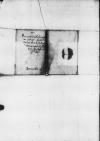Letter #674
Karel UUTENHOVE to Ioannes DANTISCUSGhent (Gandavum), 1531-08-25
English register:
Since Uutenhove can no longer meet Dantiscus in person, he is communicating with him by letter, although he is far more hesitant to write to him than to speak with him. They have had many pleasant conversations, but he fears that his writing lacks refinement and erudition. He trusts that Dantiscus, in his benevolence, will overlook this.
Furthermore, it is his great affection for Dantiscus which has incited him to write a letter.
He does not want Dantiscus to forget him, now that they no longer meet. His familiarity with Dantiscus is most precious to him, and he is hopeful that Dantiscus will perpetuate this pleasure.
He and Robbius lead a pleasant life, with frequent drinking, songs and jokes, not unlike Penelope's suitors. They often visit Jooozijne and Lynken, the daughters of the bailiff, who do not cease to reminisce about Dantiscus. Their parents also are attached to him, and they all convey their greetings. Willem De Waele, Nicolaus Uutenhove and the buffoon Robbius also recommend themselves to Dantiscus. Uutenhove’s sister sends him her respectful greetings. He asks for one more favour: whenever Dantiscus happens to meet someone who is being sent to the court of the Turkish Sultan [Suleiman the Magnificent], he should inform him and help him to join this embassy.
Uutenhove will perform any service for Dantiscus with the greatest pleasure. In a postscript he asks Dantiscus to convey his greetings to De Schepper and Gemma Frisius, and to reward the bearer of his letter with a drink.
Manuscript sources:
Prints:
| ||||||||||||
Text & apparatus & commentary Plain text Text & commentary Text & apparatus
Reverendissimo in Christo Patri, domino
Salutem plurimam.
Quandoquidem tecum coram agendi mihi potestas non integra fuit,
Porro, quod incredibilis ille meus in te animus tibi nunc voluit, breve est et fortassis non magni momenti, certe parvi momenti, si haec: amicitia, observant[ia], caritas parva existimanda sunt. Verebar etenim, ne haec corporis disiunctio ac muta absentia profundam tui Caroli tibi oblivionem induceret. Huic itaque malo ocius litteris succurrendum putavi, nam tantum sane huic tribuo notitiae, quam tecum contraxi, ut nullius umquam magis exsultarim aut mihi placuerim et, quae mea simplicitas est, non prorsus me a te contemni mihi persuadeo. Quo suavissimo deliramento ut diutius mihi frui liceat, tu fac ac serio annitere, nam hac re plurimum felicitatis addideris mihi et tibi nihil incommodaveris.
De iis rebus, quae apud nos aguntur, nescio, quod scribere debeam. Omnes recte valemus.
Quod reliquum est, hoc unum vehementer a te contendo, ut, si forte aliquando istic reperiatur, qui in aulam
Bene vale, clarissime ac doctissime Praesul.
Tuus, si suus,
Postscript:
Non gravaberis, si istic sit, salutare meis verbis et diligenter, et ex animo, dominum


